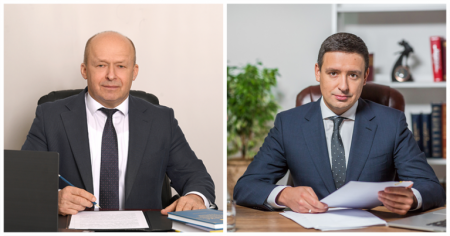Contact center of the Ukrainian Judiciary 044 207-35-46
ABOUT THE SUPREME COURT
FOR CITIZENS
ACTIVITY
PRESS-CENTER

Mykhailo Smokovych, Acting President of the Supreme Court, President of the Administrative Cassation Court within the Supreme Court, said this during a roundtable discussion on the presentation of Opinion No. 25 (2022) of the Consultative Council of European Judges on freedom of expression of judges.
The head of the court stressed the importance of such a document for the entire judicial system of Ukraine, as judging is not only a profession but a way of life. Judges must understand that they are under constant public scrutiny, even outside the courtroom. He also emphasised the relevance of the CCJE's opinions, as Ukrainian lawyers actively use them in their work. For example, judges often refer to the opinions of the CCJE and the ECtHR in their decisions, mostly in cases of administrative jurisdiction.
The speaker noted that the said CCJE Opinion could become a guideline providing clear criteria for the freedom of expression of judges not only on matters relating to the work of the judiciary, but also on other issues that may be of potential public interest. In this way, judges will have recommendations on what parameters should be taken into account in the coverage of a particular issue in the public domain.
In his speech, Mykhailo Smokovych also stressed the need for judges to observe the principle of restraint and moderation in their statements. This will help to avoid compromising the independence and impartiality of the court or undermining public confidence in the judiciary. In addition, not only current judges but also candidates for judicial office must receive appropriate professional training.
Yehor Krasnov, judge of the Supreme Court in the Commercial Cassation Court, Chairman of the Committee of the Council of Judges of Ukraine on Ethics, Prevention of Corruption and Settlement of Conflicts of Interest, Deputy Representative to the CCJE, also believes that the self-governing bodies of the judiciary should take measures to raise awareness and provide professional assistance to judges on freedom of expression. At the same time, he pointed out that the issues discussed in CCJE Opinion No. 25 (2022) and the subsequent recommendations for their resolution were already being applied to some extent by Ukrainian judges, as they are regulated by national legislation, contained in certain legal acts and in the Code of Judicial Ethics.
"The adoption of the CCJE Opinion on the freedom of expression of judges provides a new perspective on the issues we have already addressed while working on the update of the Code of Judicial Ethics," said Yehor Krasnov. He is convinced that the updated Code of Judicial Ethics will take into account the best European practices in this field.
During the event, participants also discussed ways of implementing CCJE Opinion No. 25 (2022) in Ukraine. Attention was also paid to the peculiarities of Ukrainian judges' communication on social media during the war and the impact that their statements may have on their consideration of cases in the future.
The roundtable was attended by judges of the Supreme Court, the Constitutional Court of Ukraine, appellate and local courts, representatives of the High Council of Justice, the Council of Judges of Ukraine, the National School of Judges of Ukraine, the State Judicial Administration of Ukraine, the Verkhovna Rada Committee on Legal Policy, the Ministry of Justice of Ukraine, experts from the Council of Europe and the CCJE, as well as academics and representatives of NGOs.
The CCJE Opinion is available here: https://bit.ly/3L8tKY3.
The event was organised jointly by the Supreme Court and the Council of Europe's Cooperation Programmes Department within the framework of the project "Support to the Functioning of Justice in the War and Post-War Context in Ukraine".